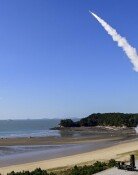[Editorial] President Rohs Staffing, Another Test Board
[Editorial] President Rohs Staffing, Another Test Board
Posted August. 18, 2005 03:05,
With Chief Presidential Secretary Kim Woo-sik resigning, attention is being focused on the possibility of a small reshuffling in the Cheong Wa Dae cabinet, and the direction of President Roh Moo-hyuns national affairs management in the later part of his term. There are already rumors that he will concentrate on using those close to him and strengthen his inner circle system, as well as increase control over national affairs. I do not think presidential staffing should proceed this away.
Control in national affairs comes from the trust of the people. When working eagerly for what the majority of the people want, the people will trust the government, and that trust will turn into strength. If the president only focuses on things that solely he, but not the people, thinks are important, it will be difficult for him to have control. For instance, plans for a coalition government, which is opposed even by some of the ruling party members, and clearing up past history are good examples. Even from within governmental workers, there are voices saying that a future vision related to mundane issues is needed, rather than such large political agendas. If the president cannot hear such voices, he cannot escape early lame ducking.
In these respects, presidential staffing is crucial. If the president only assigns posts to close associates who hold similar thoughts and ideas in order to strengthen his inner circle system, it will only lead to the trap of group thinking. In other words, decisions made within a group where the members are all very close are usually unanimous, so it is very possible for a decision to be overly biased or even wrong. We have seen the side effects of such decisions for the last two and a half years. Even when the president says things that make him lose the trust of people, instead of dissuading him, the staff at Cheong Wa Dae attacked criticizing forces and media, which is a typical example of group thinking.
Indeed, when looking at Cheong Wa Dae staffing, only a few political activists from a certain region are taking all the posts. It is already unreasonable from the start to expect them, with their ideological slant, to collect the diverse opinions of the people, and advise the president in a balanced way. Such situations should disappear. The president should find and use bright personnel who have the expertise and experience to know what the people want and how to satisfy their needs, and who are not reluctant to talk straightforwardly to the president. There is the possibility of gaining back the hearts of people with such staffing. I hope that the start of the last half of the national affairs management begins this way.







